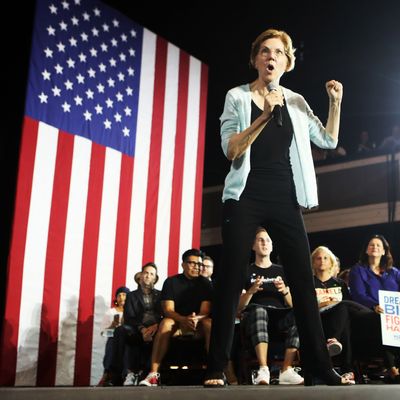
One of the interesting things about Elizabeth Warren’s gradual ascent into the Big Three of the 2020 Democratic presidential candidates who are presently dominating the party’s large field is that she’s arguably well positioned as a unity figure between centrists loyal to Joe Biden and progressives gravitating toward Bernie Sanders. That’s certainly true at the elite level, where, as I noted earlier this year, centrist antipathy to Sanders is accompanied by centrist interest in Warren:
[F]or all her populism and class-warfare rhetoric, Warren is the representative of a sharp-edged but familiar Democratic policy tradition that seeks to save capitalism from its excesses and restore economic competition, rather than treating it as dangerous or irrelevant. That, not fear of Bernie, is likely the reason for all the comparisons centrists make of her to Sanders; they share many of the same policy positions but arguably a very different perspective …
Beyond ideology, Warren is, after all, a reasonably conventional Democrat who endorsed Hillary Clinton, not Bernie Sanders, in 2016. Economic issues aside, her foreign-policy thinking reflects a dovish Democratic tradition instead of the actively leftist, Henry Wallace–progressive tradition that clearly inspires Sanders, who has stood outside the Democratic Party his entire career.
There’s now evidence that Warren’s growing acceptability is spreading to actual Democratic voters. Morning Consult reports today that she is now the top “second-choice” candidate in the field (she’s third in first preferences). She is the second-choice favorite among supporters of both fourth-place Kamala Harris and fifth-place Pete Buttigieg and has basically caught up with Joe Biden and Bernie Sanders as the top second-choice candidate for each other’s voters. Looking at another optic in the Morning Consult data, Warren’s favorability/unfavorability ratings (64/15) are pretty much as good as those of Sanders (75/18) and Biden 72/20, particularly if you keep in mind that she has some room to grow (9 percent of Democrats say they’ve never heard of her, believe it or not, and another 12 percent don’t know enough to form an opinion of her).
Now, these numbers still show Sanders and Biden as plausible unity figures, and some of the non–Big Three candidates might fill that bill if one of them takes off between now and the time voters start voting. But the longer the Big Three continue to dominate the field, the more polarization we are likely to see, and it’s probably going to most affect Biden (who more or less horrifies progressive activists and opinion leaders) and Sanders (who has the same effect on centrists, intense party regulars, and veteran Hillary Clinton fans).
The hardest thing to project is how the Warren-Sanders rivalry will play out. The two are generally thought to represent the same left-bent “wing” of the Democratic Party or “lane” in the 2020 field, and they are definitely friends and allies in the Senate. But the coalitions they are putting together are far from identical, and their approaches to campaigning differ as well. If one decisively bests the other in Iowa and New Hampshire, where both candidates are strong, you could see one of them dropping out, creating a clear left-right competition with Biden (and/or one of the non–Big Three candidates in the field). If for whatever reason both stick around and Biden doesn’t go away either, you could see a dynamic that begs for resolution via a unifying figure.
Right now, the most important advantage the old boys have over Warren is in perceived electability, which is a very big deal in this cycle. But if Trump’s popularity continues to sag and Warren, along with her rivals, keeps beating him in head-to-head trial heats, that advantage could fade, particularly if party unity is valued as an element of a successful 2020 general-election campaign. She seems very aware of her positioning, as Joan Vennochi observed after watching Warren at the New Hampshire Democratic State Convention last weekend:
In the context of a vast left-tilting Democratic primary field, Warren is now wisely carving out space as a passionate progressive who’s not a Sanders socialist. That was a key part of Saturday’s mission. As she told New Hampshire Democrats, “I get that in America there are gonna be people who are richer and people who are not so rich. And the rich are gonna own more shoes and they’re gonna own more cars and they may even own more houses. But they shouldn’t own more of our democracy.”
As Warren walks the line of separating herself from Sanders’s pure socialism while trying not to alienate his fervent believers, she’s also making the case that choosing a candidate out of fear is no way to win a presidential election. “I get it. I get it,” she said in her speech. “There is a lot at stake, and people are scared. But we can’t choose a candidate we don’t believe in because we’re scared. And we can’t ask other people to vote for someone we don’t believe in.”
Clearly, she was referring to Biden, considered the leading candidate because of his stubborn hold on that bible of political punditry, the polls.
We’ll see, perhaps beginning with this week’s debate in Houston, if other candidates begin to appeal for a gathering of Democratic tribes behind their banners.






























